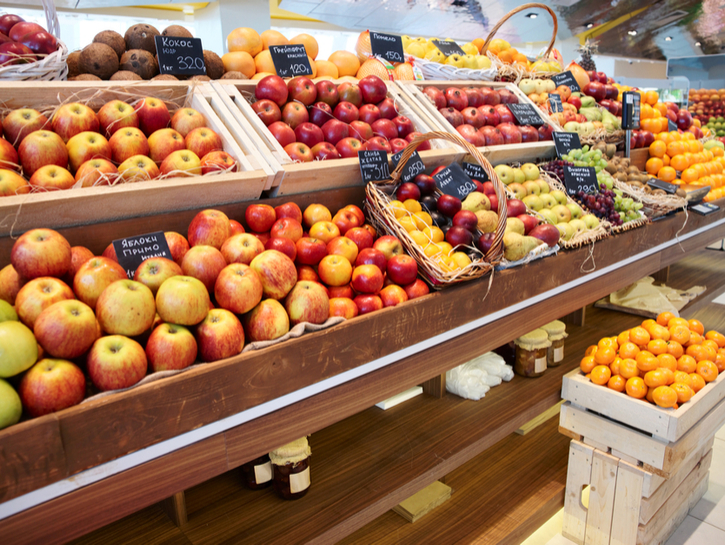When buying fruits at the store and taking them home, you could be making big mistakes without even realizing it. Here are some of the biggest mistakes people make with store-bought food:
1. Buying Underripe Fruit
Fruit goes bad fast, so it’s easy to think that if you buy your fruit a bit underripe it will be in perfect condition by the time you get around to using it. And while this can be the case for some fruit, other fruits don’t continue to ripen once they are picked.
Fruits are either climacteric or non-climacteric. Climacteric fruits, including apples, bananas, peaches, avocados, and pears, continue to ripen after they are harvested. Non-climacteric fruits, such as blackberries, cherries, pineapples, olives, watermelon and summer squashes, cease to ripen once they are picked. This difference occurs because climacteric fruits naturally produce ethylene gas, which furthers the ripening process.
If you’re unsure about which fruits are climacteric, it’s best to always buy fruits that are ripe when shopping in the produce aisle.

Bananas are a climacteric fruit, meaning they continue to ripen after they’re picked. | Paulo Vilela/Shutterstock
2. Buying Out Of Season Fruit
When you buy fruit that’s out of season, that means it was transported to your location — often from far away. During this transportation process, the fruit loses its quality, particularly its nutrients and flavor. While you can certainly buy peaches at the store in the middle of January if you’re really craving one, it’s best to buy fruits when they’re in season at your local farmer’s market. Buying fruit out of season can also be more expensive.
3. Overlooking Fruit With Blemishes
While you should avoid fruits with any rot or bruising, having a few blemishes doesn’t mean that the fruit is bad. In fact, these uglier fruits might even be better for you. There is evidence that misshapen, dimpled or scabbed fruit might even contain more nutrients than the more picturesque fruits. Picking these “ugly” fruits can also help reduce food waste and might even save you a few bucks — some grocery stores discount the more unappealing fruits, fearing nobody will want to buy them.

Fruit that has a few blemishes doesn’t mean it’s bad, but avoid all fruits with bruising or rotting. | Tommy Lee Walker/Shutterstock
4. Only Buying Fresh Fruit
Fresh fruit is the best fruit, right? Not always. Many people seem to go straight to the produce section for their fruit needs, but there is another part of the store where you can find fruit just as nutritious and tasty — the frozen food section.
Frozen fruits are picked at their peak ripeness and immediately frozen. Nutrients are slowly lost as fresh fruit is harvested stored, and studies have shown frozen fruits contain higher amounts of vitamins and minerals than fresh fruit that has been sitting out for a few days. Frozen fruits can be used interchangeably with their fresh counterparts, be stored for much longer, make exemplary additions to smoothies and save you money.
5. Refrigerating All Fruit
It’s important to know how to properly store each fruit, as some fruits need to be kept refrigerated and some must be stored on a countertop or in a pantry. While you should store those apples and berries in the fridge to slow spoiling, the cool temperature can harm certain fruits. Whole melons and tomatoes, for example, should not be refrigerated because they can lose their nutrients and spoil faster. Just remember — when storing fruit out in the open, be wary of fruit flies.

Some fruits, such as apples and berries, should always be refrigerated. | Stokkete/Shutterstock
6. Storing Different Fruit In The Same Bowl
Fruit bowls are a classic way to decorate your kitchen countertops with color, but they might not be the best way to store your fruits. This is where climacteric and non-climacteric fruits come back into play. As the climacteric fruits continue to emit ethylene gas, they can cause the surrounding fruits to spoil faster. Therefore, it’s important to keep the climacteric fruits (including apples, peaches, apricots, kiwifruits, mangos, and plums) isolated from the non-climacteric fruits.
7. Not Washing The Fruit
No matter what fruit, you should always wash it before eating. Store-bought fruits and vegetables can still have soil attached to it, and that soil can carry harmful bacteria that can cause foodborne illnesses. To effectively wash your produce, simply rinse and rub your food under tap water.

It’s important to wash all fruits before eating them, even melons. | New Africa/Shutterstock
8. Cutting Before Washing
When you wash your fruit, you should do so before prepping or cutting. If you begin cutting your fruit before washing, the harmful dirt and bacteria can spread and infect the inside of the fruit as well. You should wash all fruit, even fruits with hard outer layers, such as watermelons, to protect the edible interior from the harmful particles that are resting on the exterior.
9. Washing Before Storing
It can be tempting to rinse your fruit as soon as you return from the store to get this step out of the way, but if you wash your fruit before storing it you can actually be causing the fruit to rot faster. The extra moisture can cause fruits, especially berries, to grow bacteria and mold, causing them to spoil at a much faster rate. Therefore, stick to washing your fruit right before eating it.
